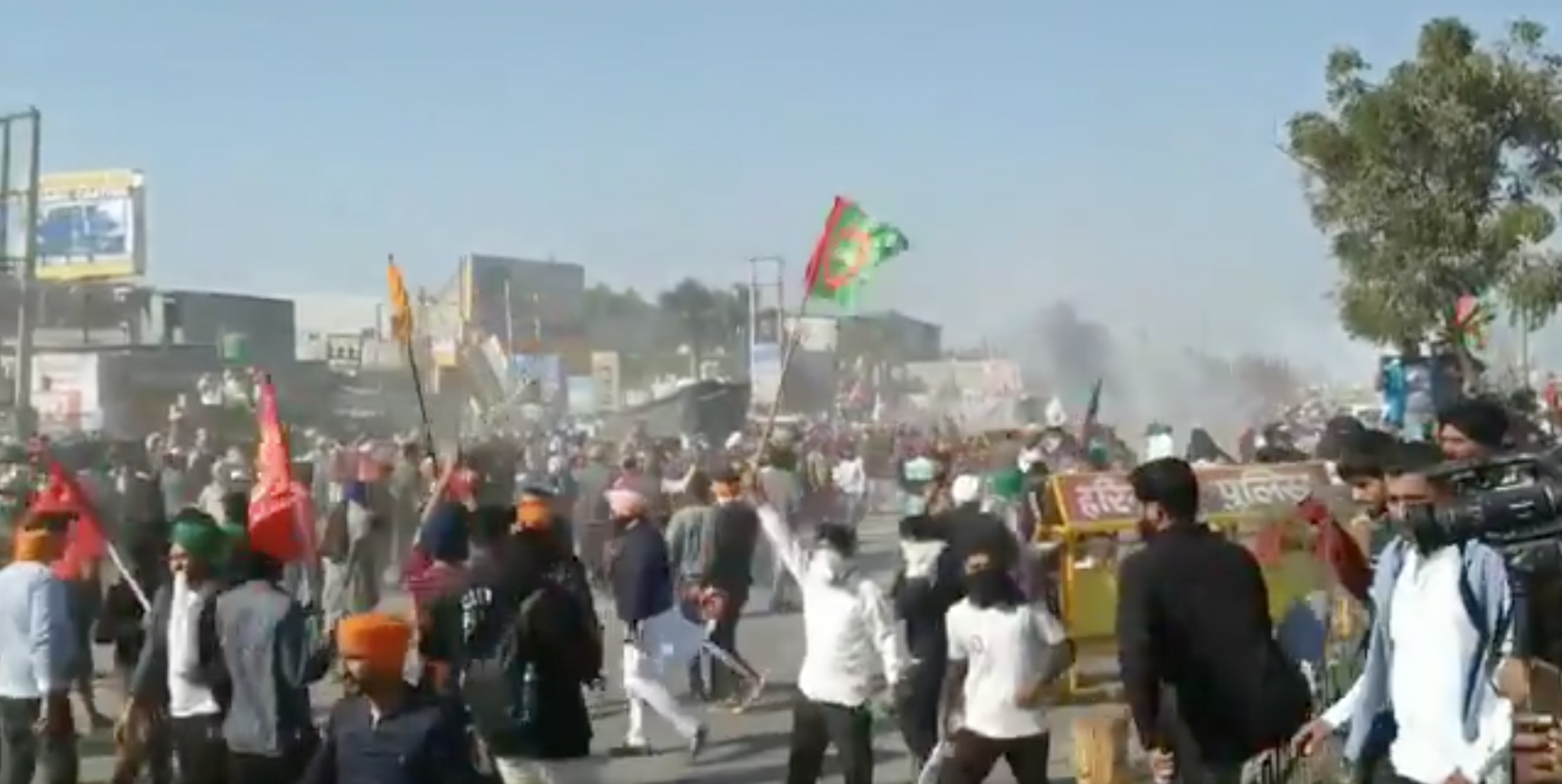
Thousands of farmers from across India’s north marched on Delhi despite efforts by police to block them with road barricades, tear-gas and baton charges Nov. 27. The cross-country march, which converged from Punjab and Haryana states, entered the capital one day after several Indian states were shut down by a general strike in support of the farmers’ demands. This was called by a newly formed Joint Platform of Central Trade Unions bringing together 10 of the country’s major organized labor federations. Leaders claimed 25 crore (250 million) workers participated in the strike. The “Chalo Delhi” (Go to Delhi) mobilization was called to protest a package of agricultural reform laws passed in September that lifts requirements for government purchases of grain at guaranteed prices. (IndustriAll, FirstPost, PTI, Al Jazeera, NDTV, AP, NewsClick)
Photo via @FightAnand





Indian farmers pledge to maintain protest campaign
India’s Supreme Court has ordered a temporary halt to implementation of three agricultural reform laws while the legislative package is reviewed, but farmers have declared the ruling a “trick” and pledge to maintain the several protest encampments they have established around New Delhi. (NYT, Al Jazeera)
The three laws that have been stayed in Rakesh Vaishnav & Ors. v Union of India are the Farmers’ Produce Trade and Commerce (Promotion and Facilitation) Act, 2020, the Essential Commodities (Amendment) Act, 2020, and the Farmers (Empowerment and Protection) Agreement on Price Assurance and Farm Services Act, 2020. An expert committee is to be formed to review the package. (Jurist)
Farmers storm India’s Red Fort
Tens of thousands of farmers marched, rode horses and drove tractors into Delhi on Jan. 26, India’s Republic Day, breaking through police barricades to storm the historic Red Fort. People watched in shock as the takeover of the fort, which was built in the 17th century and served as the palace of Mughal emperors, was shown live on hundreds of news channels. Protesters, some carrying ceremonial swords, ropes and sticks, overwhelmed police. One protester was killed, and some 200 arrested. More than 300 police officers were also reported injured. (AP, BBC News)
India: activist charged for online support of farmer protest
Indian politicians and activists on Feb. 15 condemned the arrest of 22-year-old climate activist Disha Ravi on charges of sedition for her alleged involvement with a Google document “toolkit” containing resources to support the protesting Indian farmers.
The toolkit garnered attention after it was tweeted by Swedish climate activist Greta Thunberg. Police believe that Ravi asked Thunberg to remove the document from her Twitter profile after realizing it contained identifying information. Thunberg shared an updated version of the toolkit on Feb. 3. The document encourages readers to sign petitions, contact representatives, and “continue to organise gatherings.”
Delhi police assert that Ravi was a “key conspirator” in the document’s “formulation and dissemination,” and conspired to “wage economic, social, cultural and regional war against India” on Jan. 26, India’s Republic Day. They allege that Ravi collaborated with Thunberg and the Poetic Justice Foundation “to spread disaffection against the Indian State.”
Arvind Kejriwal, chief minister of Delhi, called the arrest “an unprecedented attack on Democracy” and added that “supporting [India’s] farmers is not a crime.” Nine-year-old climate activist Licypriya Kangujam said Ravi’s arrest is “an attempt to silence the voices of young girls and women.” Thunberg has not yet commented on the matter.
Protests by farmers have continued across India since the passage of agricultural reform legislation in September, drawing attention from human rights groups around the world. (Jurist)
India: minister won’t resign over ‘Killer SUV’ charge
Indian cabinet minister Ajay Mishra is refusing calls for him to step down after charges that his son ran over potesting farmers in Lakhimpur Kheri, Uttar Pradesh. Eight people, including four farmers, were killed during a protest against Mishra’s visit to the city on Oct. 3. A car in the minister’s convoy allegedly ran over protesters. Farmers allege it was driven by his son Ashish Mishra. (NDTV)
India: minister’s son arrested in “Killer SUV’ case
Union minister Ajay Mishra’s son Ashish Mishra, the primary accused of the Lakhimpur Kheri violence, was arrested Oct. 9 after hours of interrogation by the Special Investigation Team. (Hindustan Times)
India PM repeals controversial farm laws
India’s Prime Minister Narendra Modi has announced the repeal of three controversial farm laws after a year of protests. Thousands of farmers had camped at Delhi’s borders since last November and dozens died from heat, cold and COVID. (BBC News)